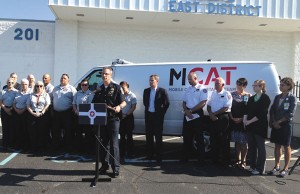On July 31, Mayor Joe Hogsett, IMPD Chief of Police Bryan Roach, IEMS Chief Dr. Charles Miramonte, officials from Eskenazi Hospital, and others celebrated the launch of the City’s pilot Mobile Crisis Assistance Team (MCAT) in front of East District headquarters. The program marks the start of an innovative approach to crisis response for IMPD. MCAT is based on an integrated health care model, bringing together the professional expertise of a police officer, a paramedic, and a licensed clinician for a 24/7 response to legal, behavioral health, substance use, and medical crises. The coordinated response is designed to improve treatment outcomes, assist individuals in making informed choices and returning to a healthy equilibrium, with the ultimate goal of diversion from arrest and connection with social services and treatment.
The team has spent the past two months participating in an in-depth training program. Training subjects ranged from mental health and addiction to homelessness and veterans’ issues, taught by an array of researchers, specialists, and subject-matter experts. The team also visited a number of community partners with resources for those in need, and facilities like the Marion County Jail and Reuben Engagement Center.
In his remarks, Mayor Hogsett noted that East District was the perfect place to launch the program, citing the high frequency of crisis calls in the district tied to addiction, mental health issues, and high rankings on the Social Disorder Index. “It’s been an epidemic,” he said. “We have no choice but to be nimble.”
The pilot of the Mobile Crisis Assistance Team became operational August 1. The Mobile Crisis Assistance Team will engage in on-scene intervention, employing strategies for resolving situations. First, the teams will help de-escalate tense situations and attempt to resolve issues on the scene, assess the needs of the people involved, such as getting individuals mental health assessments, detox assistance, or transportation to the Reuben Engagement Center. If acute behavioral health care is needed, transport to appropriate emergency department or crisis assessment center considering medical history and continuity of care If the team determines acute behavioral health and legal response are necessary, individuals will be transported to Eskenazi Hospital for psychiatric evaluation and treatment, followed by the Arrestee Processing Center where mental health intervention will continue. The MCAT teams will be on call 24 hours a day, 7 days a week.
Chief of Police Bryan Roach also stated that the teams would be brought in when appropriate to the scene of a call. From there, the three person team will evaluate individuals who may be in need of services, pre-arrest. “First responders see people when they are at rock bottom,” noting that the teams were highly trained to get the best outcomes for individuals.
MCAT is part of a larger criminal justice reform initiative started in December by the administration. The proposed reforms focus on assessment and intervention with solutions that address the root causes of crime, save taxpayer dollars, and create a more just system, keeping those who do not belong in jail, out.
The MCAT is a pilot program, and data gathered during its first year will be evaluated for effectiveness, and possibly rolled out citywide.



